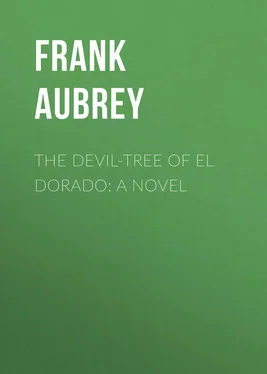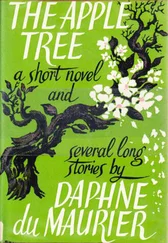Frank Aubrey - The Devil-Tree of El Dorado - A Novel
Здесь есть возможность читать онлайн «Frank Aubrey - The Devil-Tree of El Dorado - A Novel» — ознакомительный отрывок электронной книги совершенно бесплатно, а после прочтения отрывка купить полную версию. В некоторых случаях можно слушать аудио, скачать через торрент в формате fb2 и присутствует краткое содержание. ISBN: , Жанр: foreign_antique, foreign_prose, на английском языке. Описание произведения, (предисловие) а так же отзывы посетителей доступны на портале библиотеки ЛибКат.
- Название:The Devil-Tree of El Dorado: A Novel
- Автор:
- Жанр:
- Год:неизвестен
- ISBN:http://www.gutenberg.org/ebooks/43944
- Рейтинг книги:3 / 5. Голосов: 1
-
Избранное:Добавить в избранное
- Отзывы:
-
Ваша оценка:
- 60
- 1
- 2
- 3
- 4
- 5
The Devil-Tree of El Dorado: A Novel: краткое содержание, описание и аннотация
Предлагаем к чтению аннотацию, описание, краткое содержание или предисловие (зависит от того, что написал сам автор книги «The Devil-Tree of El Dorado: A Novel»). Если вы не нашли необходимую информацию о книге — напишите в комментариях, мы постараемся отыскать её.
The Devil-Tree of El Dorado: A Novel — читать онлайн ознакомительный отрывок
Ниже представлен текст книги, разбитый по страницам. Система сохранения места последней прочитанной страницы, позволяет с удобством читать онлайн бесплатно книгу «The Devil-Tree of El Dorado: A Novel», без необходимости каждый раз заново искать на чём Вы остановились. Поставьте закладку, и сможете в любой момент перейти на страницу, на которой закончили чтение.
Интервал:
Закладка:
“Wouldn’t it be simpler to go up the bed of this stream that you seem to have been following more or less all the time, even if it be longer?” observed Jack one day.
Monella shook his head.
“No use, my friend. It divides into so many branches; and then again, in case of a rise of its waters, we should have all our road submerged at once.”
On Sundays they always rested. This, it appeared, had been Monella’s custom all along.
In his conversations in the evenings and during their Sunday strolls, he would instruct and amuse his hearers with his reminiscences and adventures in all parts of the world, or with his intimate knowledge of the wild life around them. From his account, he had undergone, at times, terrible and extraordinary hardships and privations on the plains and in the forests of India and Africa; of Australia; the Steppes of Tartary; the Highlands of Thibet; the interior of China and Japan; the wilds of Siberia; of Canada; the prairies of North America, and the pampas, plains, and rugged mountains of South America – all, as Dr. Lorien had said, seemed to be alike known to him. Nor was he less familiar with the countries and cities of Europe; yet he spoke of his travels and experiences in a simple manner that had in it nothing of boastfulness or ostentation, but as though his sole object were to amuse and entertain his two young friends.
As they penetrated farther into the forest, their work became harder and the progress slower. This latter was unavoidable, since each day they had to walk farther and farther to and fro. Moreover, the Indians, who had displayed greater courage – so Monella had said – now that they had two more white men with them, once more began to show signs of nervous apprehension and fear.
This was doubtless due to the great difference in many ways – some definite enough, others indefinable and vague – between this forest and those generally to be found in the tropical regions of South America. Not only were the trees still more gigantic – making it gloomier – and the undergrowths more dense and tangled, but the birds and animals, judging from their cries, were unfamiliar to them. Many of the sounds usual to forest life in British Guiana were absent; the constant note of the ‘bell-bird’ was not heard, nor was even the startling roar of the howling monkeys. Instead were heard other sounds and noises of an entirely novel and peculiar kind, unknown even to the Indians who had been used to forest travelling all their lives; sounds that even Monella either could not explain – or hesitated to. One of these was a horrid combination of hiss and snort and whistle, loud and prolonged like the stertorous breathings of some monstrous creature. Some of the Indians declared that this was the sound traditionally said to proceed from the great ‘camoodi,’ the monstrous serpent that is supposed to guard the way to Roraima mountain; while others inclined to the opinion that it was made by the equally dreaded ‘didi,’ the gigantic ‘wild man of the woods,’ that also had, as they averred, its special haunts in this particular forest. At times, a startling, long-drawn cry would echo through the wood, so human in its tones as sometimes to cause them to rush in the direction it seemed to come from, in the belief that it was a cry for help from one of the party who was in danger. This strange, harrowing cry, the Indians called ‘The cry of a Lost Soul’ 6 6 This strange cry is often heard in the depths of the forests in this region, and has never been accounted for, the only explanation given by the Indians being the one stated above, viz., that it is ‘the cry of a Lost Soul.’ It is alluded to by the American poet, Whittier, in the following lines: — “In that black forest where, when day is done, ***** Darkly from sunset to the rising sun, A cry as of the pained heart of the wood, The long despairing moan of solitude And darkness and the absence of all good, Startles the traveller with a sound so drear, So full of hopeless agony and fear, His heart stands still, and listens with his ear. – The guide, as if he heard a death-bell toll, Crosses himself, and whispers, ‘A Lost Soul!’”
; and they were always seized with panic when it was heard.
There were other cries and sounds equally mysterious and perplexing; and, so the Indians began to declare, strange sights too. Of these they could give no clear account, but they maintained that, in the shadows in the darker places, or just before nightfall, while returning from their work, they now and then caught passing glimpses of vague shapes that seemed to peer at them and then disappear within the gloomy forest depths. And even Elwood and Templemore were conscious of the occasional presence of these silent unfamiliar shapes, and sometimes fired at them, though without result. These facts they made no attempt to conceal from one another, though, in their intercourse with the Indians, they put a bold face on matters, and affected to disbelieve the stories told them.
Monella alone was – or appeared to be – entirely undisturbed by all these things. If conscious of them, he gave no sign of it, but went about whatever he had to do as though danger were to him an unknown quantity.
There was, however, one unpleasant fact that could not be ignored, and that was the unusual number of ‘bush-masters’ of large size in the wood. This is a poisonous snake, very gaudily coloured, whose bite is certain death. It does not – like most serpents – try to get out of the way of human beings, but, instead, rushes to attack them with great swiftness and ferocity. It is the only aggressive venomous snake of the American continent. It usually attains a length of five or six feet; but, in this forest, the explorers killed many of eight or nine feet, and two – that came on to the attack together – were nearly eleven feet long, with fangs as large as a parrot’s claw. In consequence of the frequency of the attacks of these reptiles, so much dreaded by the Indians, and indeed by all travellers, one or two of a working party, armed with shot guns, had to be told off to keep watch; rifles being of no use for the purpose.
Templemore, as it happened, had had a bad fright when a child from an adventure with a snake; and this – as is frequently the case – had left in his mind, all the rest of his life, a great horror of serpents. He found, therefore, the presence of these ‘lords of the woods,’ as their Indian name implies, a source of ever-present abhorrence.
Besides the ‘bush-masters,’ there were the ‘labarri’ – also a large venomous snake, but not aggressive like the other – and rattlesnakes. There were also, no doubt, boa-constrictors, or ‘camoodis,’ of the ordinary kind; but, thus far, only one had been seen, and that, though large, was nothing out of the way as regards size for that country.
Nor were serpents their only visible enemies; there were others of a kind new to the two young men. One day, while with the working party at the farthest part of the track, they heard the whole forest suddenly resound with a perfect babel of discordant noises. There were shrill cries and squeals, hoarse roars and growls, then a kind of trumpeting. The Indians retreated, throwing down their axes to pick up their rifles. As they hastily retired, four large animals sprang into their path, one after the other, with loud roars and growls. But Monella, who was behind Elwood, stepped forward and rolled two over with his repeating rifle, and Jack stopped another of the beasts with his. The fourth, apparently not liking the way things were going, leaped into the thicket and disappeared; though, judging from the sounds that came from the direction it had taken, there were many more of its fellows close at hand. Gradually their cries grew fainter, until they died away in the distance.
Читать дальшеИнтервал:
Закладка:
Похожие книги на «The Devil-Tree of El Dorado: A Novel»
Представляем Вашему вниманию похожие книги на «The Devil-Tree of El Dorado: A Novel» списком для выбора. Мы отобрали схожую по названию и смыслу литературу в надежде предоставить читателям больше вариантов отыскать новые, интересные, ещё непрочитанные произведения.
Обсуждение, отзывы о книге «The Devil-Tree of El Dorado: A Novel» и просто собственные мнения читателей. Оставьте ваши комментарии, напишите, что Вы думаете о произведении, его смысле или главных героях. Укажите что конкретно понравилось, а что нет, и почему Вы так считаете.












